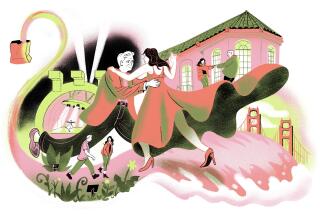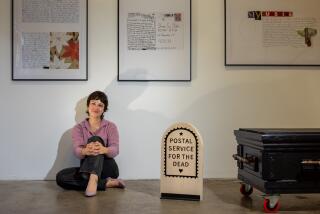Billet-Dupe : A Love Letter Reveals the True, Domineering Nature of a Smitten Man
- Share via
OCCASIONALLY HERE I have lamented the passing of the personal letter, imagining that it called forth more compassion from its author than the computer or the telephone, and that it promoted the development of fine feelings and literary skills.
Surely the love letters of the pre-electronic age were more leisurely, tender and poetic than today’s communications, which are often delivered by one lovelorn principal to the other’s answering machine and answered the same way.
If we were able to look in the trunks in old attics, though, and read some of those old letters, we might find them flawed by the same sexist prejudices and verbal ineptitudes that cause today’s “failure to communicate” between men and women.
A graphic example of this disenchanting possibility is an original letter sent to me by John H. Barrett of Encinitas. He says: “My wife came upon the enclosure among some long-forgotten papers in an estate for which she was executor.”
The letter is written in black ink on tablet-sized paper with faded blue lines. There is no clue to the place of origin, but the date was Thursday, April 18, 1895. I trust that the author is not likely to be offended by its publication.
The addressee is not named. The letter is addressed to “My own little country sweetheart.” It reads as follows:
“Your letter of the 17th at hand, and I was awful glad, darling, to get it, for do you know I had almost thought you had forgotten me and was agreeably surprised to get this one, although it lacked the sentiment of love which we have declared for each other time and again.
“With arms enfolding your sweet head, I have told you of my love. How I wish you were here at this moment that I could fold you to my heart and whisper words of love to you and tell again and again of my love for you.
“Alas, you are far from me now, sweetheart. I cannot speak the words. I can only be content to write.
“I am indeed sorry, dearest, that you should feel so indignant toward me. I really had no cause to accuse you so wrongfully. Your letter, sweetheart, was without any tender feelings toward me, without a single word of love. Oh dearest, have you so soon forgotten the lovers’ vows? Tell me you still love me and that you are my own darling.
“I am surprised that you still persist in riding a wheel. It’s so undignified to see a sweet country lass astride a wheel. It’s really shocking, to say the least, vulgar. Why not ride Broncho, the four-footed friend who stands up and shakes hands with the air?
“Good night, good night. I cannot say goodby from me who loves you. Write soon as you get this, dear. A good letter full of love.”
It is signed “Clifton C. Miller.”
Intruding on such a document, one can’t help wondering at the nature of the obvious rift between Miller and the object of his affections. Evidently, her last letter was cold if not final.
I have an idea that the young woman was fed up with Miller’s strait-laced expectations, which are illustrated not only by his absurd opinion that it is vulgar for a lady to ride a bicycle but also by his formal signature. And how quickly he turns from protestations of love to his fussy rebuke about the “wheel.”
If Miller disapproved of his lady love’s riding a bicycle, what other female excesses might he also have frowned on? She probably wore rouge or got a job or wore her skirts above the ankle. Or maybe he caught her reading “Madame Bovary” or the short stories of Guy de Maupassant and gave her a piece of his Victorian mind. Whatever it was, she must have committed some sin against his notion of propriety. He reproached her, and she decided he was a twerp.
His disapproval does not reflect anything as grievous as an infidelity on her part. He would not have responded to that kind of affront with such saccharine endearments.
What troubles me about the affair is that she evidently saved the letter. If I had been she, I’d have torn the letter into small pieces and left a message on his answering machine:
“Get lost, creep!”
Then I’d have pulled up my skirts and ridden off on my bicycle.
Photographed by Neal Brown; antiques courtesy of P. J. R. Antiques, Pasadena.
More to Read
Sign up for our Book Club newsletter
Get the latest news, events and more from the Los Angeles Times Book Club, and help us get L.A. reading and talking.
You may occasionally receive promotional content from the Los Angeles Times.










